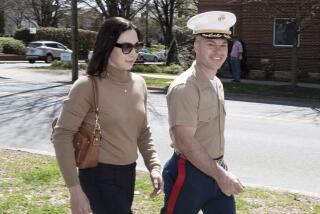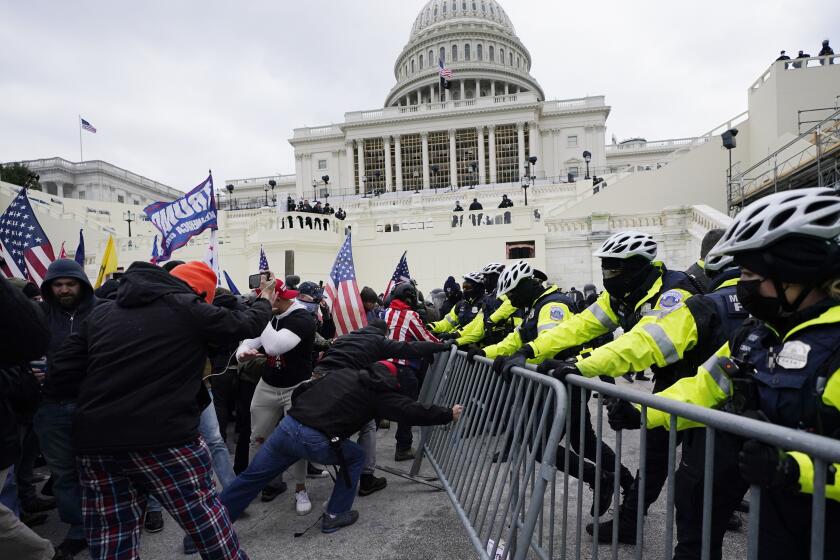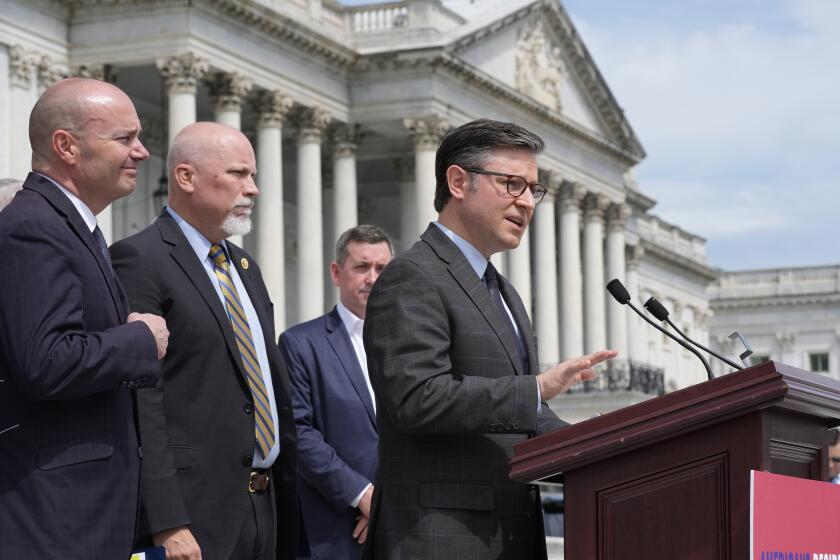Muslim Marine’s long, strange tale is recounted in court-martial
Cpl. Wassef Ali Hassoun was an unhappy Marine.
At his base in Fallouja, Iraq, in 2004, he complained about an extended deployment and refused to perform certain duties, according to fellow Marines. He longed to be with the Lebanese woman — his cousin — he’d wed in an arranged marriage.
A military prosecutor said Hassoun, a native of Lebanon and a naturalized U.S. citizen, warned his comrades: “I’ll leave and go to Lebanon. I’m not kidding.”
Hassoun indeed wound up in Lebanon in June 2004, the first step on a decade-long odyssey that reached a climax at a court-martial here on charges that he twice deserted his unit. He sat placidly in the dock as prosecutors dissected his actions spanning 10 years and two continents in what his lawyer calls “a rush to judgment … worthy of a novel, a spy novel.”
Hassoun, 35, a balding former interpreter with a clipped mustache, has pleaded guilty to an unauthorized absence. But he says he is not guilty of desertion, larceny and destroying government property, charges that could result in up to 27 years in prison.
Hassoun’s court-martial has been a study in religious and cultural dynamics inside the Marine Corps. It has opened a window on the strains and pressures faced by at least some Muslim Americans serving in a U.S. military at war with extremists who claim to be defenders of Islam.
To prosecutors, the corporal is a duplicitous self-aggrandizer who preferred the company of Arab workers to Marines and twice abandoned his battle buddies. To Hassoun’s lawyer, he is a loyal Marine who was nearly killed by insurgents in battle and performed an invaluable service as an interpreter during interrogations of suspected militants.
Hassoun’s faith and ethnicity were at the heart of closing arguments by both sides Friday. The defense spoke of a “clash of cultures” that left Marines suspicious of the corporal’s motives.
His lawyer, Haytham Faraj, said prosecutors were “hoping to hit a jackpot” by linking Hassoun and his family to insurgents. “What they find out in the end is it’s just an American family with different names and a little browner skin,” Faraj said.
A prosecutor described Hassoun as “torn between two cultures: the Marine Corps and his upbringing as a Sunni Arab.”
Hassoun’s family was so opposed to the war in Iraq, prosecutors said, that he never told them he had deployed there. The defense, meanwhile, said the family’s home and business in Lebanon were attacked after Hassoun’s Marine service was revealed.
From the day he disappeared in Fallouja, the government says, Hassoun lived a picaresque existence. It included a marriage ceremony performed over the phone, work as a bodyguard for a Lebanese politician, appearance in a hostage video with a sword over his head, and an eight-year Lebanese court case rivaling Charles Dickens’ legal saga “Bleak House.”
In court, Hassoun, in a starched uniform with service ribbons, looked nothing like the slender, narrow-faced 24-year-old who disappeared in June 2004. He is stocky, with heavy features and spectacles.
A military judge, Marine Maj. Nicholas Martz, told Hassoun he would begin deliberating a verdict Monday. The corporal elected to have his case decided by a judge rather than a military jury.
Prosecutors said Hassoun made elaborate preparations to abandon his post in 2004. He burned some possessions. He asked an Iraqi interpreter whether he could hide in his house. He packed a civilian backpack with a map and an Iraqi dialect book, dressed in civilian clothes and slipped out a remote, unmanned exit gate, prosecutors said.
Days later, Hassoun emerged in the purported kidnapping video. But he soon showed up unharmed at the U.S. Embassy in Beirut and was returned to the U.S. for an investigation.
At Camp Lejeune, he was charged in December 2004 with desertion. Inexplicably, as Hassoun was awaiting a court hearing, he was granted a Christmas holiday leave to visit his parents and brothers in Utah.
In court Friday, Hassoun took the stand and admitted that during his leave he fled to Lebanon via Canada. He said he went to negotiate with his wife’s family over a divorce he was seeking.
Within 24 hours of arriving in Lebanon in January 2005, Hassoun testified, he was served with an order by Lebanese security officers to appear for questioning. Lebanese authorities were responding to a U.S. extradition request, he said.
Thus began what Hassoun said was an eight-year legal ordeal in which he was tried in Lebanese courts. He said he could not return to the U.S. because his passport was seized and his travel restricted. Hassoun said he ultimately paid a $500 fine to settle the case, which focused on “how I entered Lebanon” and details of the U.S. extradition request.
He admitted that he never contacted his Marine unit during his time in Lebanon. “There was no need for me to contact them because they knew what was going on,” he testified.
Nor did Hassoun contact the U.S. Embassy. “I didn’t think they could help me with the issues I was having,” he said.
Only after Lebanon lifted his travel restrictions did he decide to turn himself in to Navy investigators in Bahrain in June last year, Hassoun testified. But prosecutors said his hand was forced when, after applying in Beirut for U.S. visas for his wife and two children, military investigators found him.
Since June, Hassoun has been held in a military brig. On Friday, he stared impassively as a prosecutor, Capt. Christopher Nassar, called him “disgruntled” — resentful that his deployment had been extended and refusing to interpret interrogations in which Islam was discussed. He feared combat, Nassar said.
“He didn’t want to die in Iraq,” Nassar said. “He left his fellow Marines behind.”
Nassar said Hassoun raised suspicions from fellow Marines by spending much of his time with Iraqis working on the Falluja base. He often slept in an Iraqi-run base barbershop.
“I can’t handle it anymore.... I’ll leave. I’ll go to Lebanon,” the prosecutor quoted Hassoun as telling other Marines.
Nassar said Hassoun deserted his unit “not once, but twice” and spent 10 years on the run because he could not measure up to the discipline and self-sacrifice required of Marines.
Faraj, who served as a Marine officer, countered by portraying Hassoun as a loyal Marine ostracized because he spent so much time with Iraqi workers. His Muslim and Arab identities “made him an outsider, not a member of the Marine Corps tribe,” Faraj said.
Hussein was no deserter, he said. He’s a classic immigrant: a man who grew to love and serve his adopted country. Hassoun, who arrived in the U.S. on a student visa in 1999, joined the Marine Corps three years later, inspired by the Sept. 11 attacks.
“He joined to dispel the myths about people like him,” his lawyer said.
More to Read
Start your day right
Sign up for Essential California for news, features and recommendations from the L.A. Times and beyond in your inbox six days a week.
You may occasionally receive promotional content from the Los Angeles Times.







